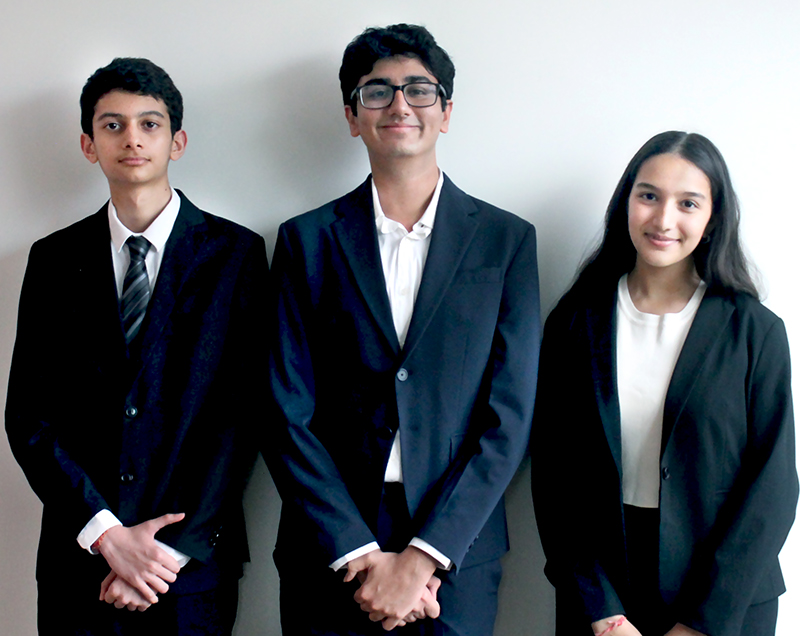
President of SOCHUM : Agasthya Bhatia
Deputy President of SOCHUM : Yash Desai and Kaira Desai
“Where, after all, do universal human rights begin? In small places, close to home. Unless these rights have meaning there, they have little meaning anywhere.”
- Eleanor Roosevelt
Dear Delegates and MUN Directors,
In an era defined by intersecting global emergencies, ranging from armed conflict and forced displacement to institutional breakdown and rising inequality, the world faces polycrisis.
The Social, Humanitarian & Cultural Committee (SOCHUM) stands at the forefront of navigating this evolving global order, where overlapping humanitarian, cultural, and social challenges demand not only urgent attention but also thoughtful, multidimensional solutions.
This year, SOCHUM offers delegates the space to engage with the complexities of this interconnected crisis landscape. Delegates will confront issues rooted in historical tensions, emerging legal vacuums, and fragile social systems, all of which require a deep understanding of human and cultural rights, international norms, and ethical responsibility.
Our first agenda is “Promoting the rights of ethnic and religious minorities in post-conflict Nagorno-Karabakh.” In the aftermath of Azerbaijan's 2023 military offense in Nagorno-Karabakh, the complete displacement of the Armenian population from the region has led to the systematic erosion of Armenian cultural and ethnic identity. Religious sites have been desecrated, with monasteries such as Dadivank being repurposed as "Albanian Christian heritage" without community consent, amounting to cultural laundering. Former Artsakh leaders and educators face detention, contributing to the suppression of cultural memory, while repatriation policies criminalize Armenian identity and condition on assimilation. Many Armenian women remain stateless and denied healthcare, and the collapse of regional education systems threatens the preservation of native dialects. Addressing these injustices is crucial to restoring rights, preserving identity, and ensuring sustainable peace in the region.
Our second agenda is “Establishing Cohesive Regulations for Surrogacy Arrangements with a Strong Emphasis on Safeguarding the Rights of Children.” The increasing incidence of surrogacy arrangements, particularly cross-border commercial surgery, underscores the need to establish cohesive international regulations that rigorously safeguard the rights and welfare of children. In line with the principles of the Convention on the Rights of the Child (UNCRC), every child has the right to identity, knowledge of their origins, and psychological well-being. In the absence of comprehensive legal frameworks, unregulated commercial surrogacy poses significant risks, including the commodification of children, potential trafficking, and instances of abandonment. Effectively regulating surrogacy arrangements is essential to ensuring ethical standards, preventing exploitation, and upholding the dignity and legal recognition of all children born through such means.
Our third agenda is “Addressing the Social and Humanitarian Consequences of Gang Violence and State Collapse in Haiti.” After a seemingly ceaseless onslaught of natural disasters coupled with decades of political instability, Haiti, the poorest country in the Western Hemisphere has finally capitulated after the assassination of President Jovenel Moïse in 2021. The capital city, Port-au-Prince, along with several other regions are majorly controlled by armed gangs, leading to disruption in delivery of essential public services including education and healthcare. Hospitals and schools have also been attacked by these gangs accompanied with stoppage of humanitarian missions in Haiti due to safety reasons. Haiti’s culture is also at stake here, with religious institutions like voodoo temples and churches now threatened by violence and gang control. In these years of volatility, it is up to SOCHUM to address the social and humanitarian issues prevalent in the region, aid in restoration of public service and preserve Haitian culture.
We strongly urge all delegates to approach these topics with empathy, curiosity and an unwavering commitment to birthing justice in all cultures and societies. SOCHUM is not just a committee that houses debate - it is a forum where ideas come to life and diplomacy becomes a tool for restoring identity, dignity and rights. Let us together reaffirm the belief that human rights are indivisible, cultural heritage is irreplaceable and that every voice needs to be heard.
Warm Regards,
Agasthya Bhatia
Head Chair of the Social Humanitarian and Cultural Committee,
Yash Desai and Kaira Desai
Deputy Chairs of the Social Humanitarian and Cultural Committee
DAIMUN 2025